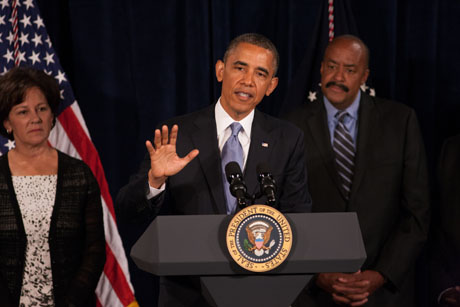President Obama insisted Friday that “Big Brother” has played by the rules while keeping tabs on nearly every phone call made within the nation’s borders during the last seven years.
At a press conference held inside San Jose’s Fairmont Hotel, Obama spent more time talking about the recent furor over the National Security Agency’s pervasive collection of telephone call data than he did about a new program designed to enroll California’s Latino population in healthcare through the Affordable Care Act—the reason for gathering.
“In the abstract, you can complain about ‘Big Brother’ and how this is a potential program run amok, but when you actually look at the details, I think we’ve struck the right balance,” Obama said.
The classified program was first revealed in a report by The Guardian’s Glenn Greenwald, who found that Verizon has handed over all call logs—who called, who received the call and how long the call lasted—on an “ongoing, daily basis.” The expanse of the surveillance has now been found to be much more widespread.
President Obama on Friday admitted that the classified program has been operational since 2006, but he stressed that government officials were not listening in on the phone calls of ordinary citizens.
“When it comes to telephone calls, nobody is listening to your telephone calls,” he said. “That’s not what this program is about.”
While the program was classified until just a couple days ago, the President said that every member of Congress was aware of its existence, and federal judges had close watch over any surveillance that went beyond noting call logs.
“The programs are secret in the sense that they’re classified, but they’re not secret in the sense that when it comes to telephone calls, every member of Congress has been briefed on these programs,” Obama said, adding that the programs were authorized by “broad bi-partisan majorities repeatedly since 2006.”
Noting he had “skepticism” about the vast surveillance when coming into office, Obama said a review by his office found it was necessary to sacrifice privacy and keep the program in place while installing additional safeguards and audits.
“My assessment and my team’s assessment was that they help us prevent terrorist attacks,” he said. “And the modest encroachments on privacy that are involved in getting phone numbers or duration, without a name attached or looking at content, on the net, it was worth us doing. Some folks may have a different assessment of that.
“You can’t have 100 percent security, and then also have 100 percent privacy, and zero inconvenience. We’re going to have to make some choices as a society.”
Obama said he welcomed a national debate on the issue, which led another reporter in the room to ask a follow-up question on whether he welcomed leaks.
“I don’t welcome the leaks. There’s a reason these program are classified,” Obama said, before pivoting to a cost-benefit analysis.
“There’s a suggestion that somehow any classified program is a ‘secret’ program, which means it’s somehow suspicious. The fact of the matter is in our modern history there’s a whole range of programs that have been classified.
“Our goal is to stop folks from doing us harm, and if every step that we’re taking to try and prevent a terrorist act is on the front page of the newspapers or on television, then presumably the people who are trying to do us harm are going to be able to get around our preventive measures. That’s why these things are classified. But that’s also why we set up congressional oversight.”
The extent of the surveillance seems to be a sticking point, one Obama will certainly address more thoroughly in the coming days.
“If people can’t trust not only the executive branch, but also don’t trust congress and don’t trust federal judges to make sure that were abiding by the constitution, due process and the rule of law, then we’re going to have some problems,” he said.
Obama flew to Southern California later in the morning to meet with China’s President, Xi Jinping.


Yeah.. “modest encroachments on privacy”.. ok..
Guess you read my emails and tap my phone and come to CA every few months to tap our money. Now I guess IRS will check my returns.
Thank you, so much for our given rights.
This is yet another one of those trust us, we know what we’re doing, we’re not up to no good or we’re going to get to the bottom of this events.
I’m OK with trust, I think trust only goes so far.
http://en.wikipedia.org/wiki/Trust,_but_verify
Has anyone called other cell service providers to see if they’re doing the same thing?